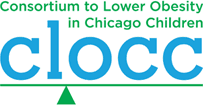What Is CLOCC?
The Consortium to Lower Obesity in Chicago Children (CLOCC) is a nationally recognized childhood obesity prevention program.
Our Mission
Our mission is to confront the childhood obesity epidemic by promoting healthy and active lifestyles for children throughout the Chicago metropolitan area. Our work will foster and facilitate connections between childhood obesity prevention researchers, public health advocates and practitioners, and the children, families, and communities of Chicagoland.
History of CLOCC
Since 2002, we have built a vital, broad-based network of thousands of participants and organizations. Currently, there are over 3,000 participants in CLOCC representing over 1,200 organizations. We are data-driven and evidence-based, committed to building capacity among our partners. The Institute of Medicine, the US Surgeon General, the American Medical Association, and the Centers for Disease Control and Prevention have recognized CLOCC as an outstanding community obesity prevention model. Our strategies include environmental change, public education, advocacy, research, outcome measurement, and program evaluation. CLOCC is housed at the Ann and Robert H. Lurie Children’s Hospital of Chicago.
Our Goals
- To improve the science and practice of childhood obesity prevention
- To expand and strengthen the community of public health practitioners, community leaders and organizations, clinicians, researchers, corporations, and policy makers working collaboratively to confront childhood obesity in Chicago and beyond
- To expand the 5-4-3-2-1 Go!® and fiveSMART™ public education campaigns to shift our local culture toward one that supports lifestyle measures that will bring about reduction in childhood obesity in Chicago
- To cultivate a long-term broad base of government, philanthropic, and industry funding to sustain childhood obesity prevention work in Chicago and beyond
- To identify culturally appropriate and relevant childhood obesity reduction approaches that work, and to disseminate and institutionalize them at all levels of social ecology (individual, family, community, institutional, public policy)

